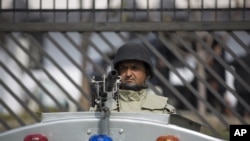Pakistan’s National Assembly voted overwhelmingly Tuesday to reinstate military courts in the country for two years, after a two months lapse.
The courts were first introduced for two years in January 2015 to expedite the cases of hardcore terrorists after Pakistani Taliban attacked an army school in Peshawar killing more than 140 people, mostly children.
Almost all of the country’s political parties who voted for the constitutional amendment, including the ruling PML-N party, acknowledged setting up a parallel system of justice is not an ideal solution, but said the step was necessary to deal with the extraordinary level of terrorism in the country at the time.
But human rights activists complain the military courts fail to provide transparent justice and violate the suspects’ legal rights, unlike civilian courts.
“The Pakistani government has a responsibility to prosecute those committing violent attacks, but secret, rights-violating military courts raise serious questions as to whether justice is being done,” said Brad Adams, Asia director at Human Rights Watch.
Prime Minister Nawaz Sharif’s administration had initially introduced the courts as a temporary solution, while promising to reform the country’s civilian justice system.
The argument at the time was the country’s civilian justice system was too corrupt, the courts too slow, police investigations too imperfect, and the system too prone to outside pressure at various levels, including threats from militant organizations, to be able to effectively try terrorism suspects. Witnesses were often afraid to appear in civilian courts to give testimony against hardcore militants.
Meanwhile, legal activists complain little has been done to reform the police and the judiciary in the past two years.
“Bringing back military courts is an attempt to deflect attention from the real issue: the Government’s failure to enact reforms to strengthen the criminal justice system during the two years the 2015-2017 military courts were in operation,” said Sam Zarifi, Asia Director for the International Court of Justice, the judicial organ of the United Nations.




